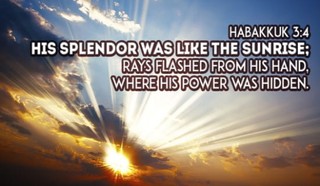
- Recent Translations
- All Translations
Habakkuk 3:4
Share
Settings
Images for Habakkuk 3:4

Habakkuk 3:4 Meaning and Commentary
And [his] brightness was as the light
Of fire, of devouring fire on the top of the mount, to which the sight of his glory was like, ( Exodus 24:16 ) to which Kimchi refers it. Aben Ezra thinks the pillar of fire is intended, in which the Lord went before his people in the wilderness, ( Exodus 13:21 Exodus 13:22 ) or as the light and splendour of Bereshith, as the Targum, of that primogenital light which was produced on the first day of the creation; or as the light of the seven days of the creation, as Jarchi; see ( Isaiah 30:26 ) or rather as the light of the sun shining in its full strength, Christ being the light of the world, and the sun of righteousness; and so may describe him as the brightness of his Father's glory; or his glory, as the only begotten of the Father, seen by his own disciples in the days of his flesh, shining through his works and miracles; or as exhibited in the light of his glorious Gospel, which is the great light that shined on men; and in and by which they that sat in darkness saw light, and who were darkness itself were made light in the Lord: what a glory, lustre, brightness, and light, did the Gospel spread in the world at the first publication of it! he had horns coming out of his hand;
which the Jewish interpreters understand of Moses having horns or beams of light and glory from the hand and power of God, when he conversed with him on the mount, and the skin of his face shone, where the same word is used as here, ( Exodus 34:29 Exodus 34:35 ) though some of them interpret it of the two tables of the law, which came from the hand of the Lord, edged with glory and brightness, and looked like fire; hence called a "fiery law", ( Deuteronomy 33:2 ) . The words may be rendered, as in the margin, "he had beams" coming "out of his side" F7; and be understood of Christ, who has beams and rays of glory on all sides of him, all around him; he is all glory F8; he is crowned with glory and honour, and highly exalted at his Father's right hand, above all principalities and powers: and "horns" being an emblem of power and might, authority and dominion, the phrase may denote that power and authority in heaven and in earth are given to him as Mediator, and exercised by him. Van Till observes, that the word "horn" is a military term, and is used for the wings of armies, the right and left; and as Christ is here described as a General of an army, marching forth in a warlike manner; these may denote the armies or companies under him, at his hand, and under his command, accoutred, and ready to obey his orders; and particularly may have respect to the division made among the apostles, whom he sent forth to subdue men to him; committing the Gospel of the circumcision to Peter, and of the uncircumcision to Paul, ( Galatians 2:7 Galatians 2:8 ) whose ministrations were made successful to the pulling down of the strong holds of sin and Satan, and reducing many to the obedience of Christ: and there [was] the hiding of his power;
that is, in his hand; there his power, which before was hidden, was made manifest; and yet so little displayed, in comparison of what it is in itself, that it may be rather said to be hid than revealed; or there, in his hand, lies his power, with which he hides and covers his people in the day of battle; especially his ministering servants, whom he holds in his right hand, and preserves them amidst a thousand dangers and difficulties, and keeps them for further usefulness; see ( Acts 18:10 ) ( Revelation 2:1 ) . The Targum is,
``sparks went out from the chariot of his glory; there he revealed his majesty, which was hid from the children of men, with sublime power.''Aben Ezra thinks the ark is meant by "the hiding of his power", called "the ark [of his] strength", ( Psalms 132:8 ) .
F7 (wl wdym Mynrq) "e lateribus utrinque emicabant cornua", i. e. "radii", Drusius.
F8 So R. Joseph Albo interprets them of sparks of spiritual light, which come from God himself, and not another. Vid. Sepher Ikkarim, l. 2. c. 29.